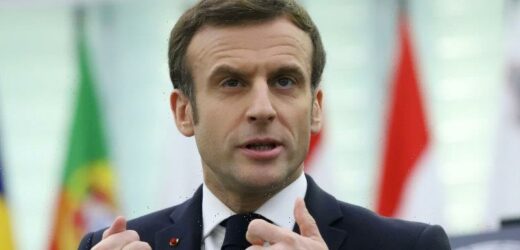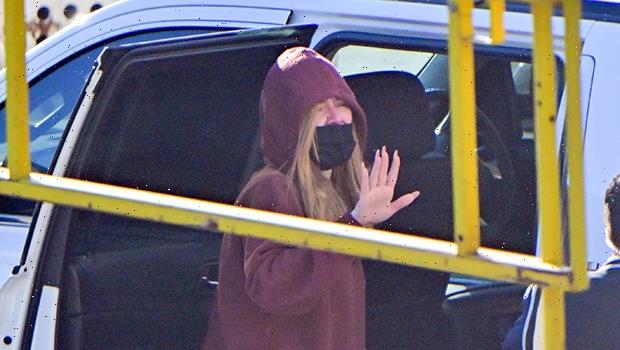Paris: He has a full campaign team fanning out around France, meeting with voters. He makes speeches about his plans for the country. The problem? French President Emmanuel Macron hasn’t officially declared that he’s a candidate for April’s presidential election.
Critics say he’s unfairly using his taxpayer-funded presidential pulpit to campaign for a second term while dragging out his widely expected announcement as long as possible.
French President Emmanuel Macron talks to officials and workers at a nuclear turbine production site in Belfort on what was not (officially) a campaign visit.Credit:AP
Less than two months before April 10’s first round, Macron’s intention is no mystery. He said last month that he has “the desire” to run for a second term, but he wanted to wait for the COVID-19 situation to improve before making a decision. The deadline to formally declare candidacy is March 4.
Far-right presidential contender Eric Zemmour accused Macron of trying to use the pandemic to make French voters forget about what he considers France’s decline.
“Is Emmanuel Macron using the health crisis to start campaigning? The answer is yes,” Marine Le Pen, the other far-right candidate, charged. Like the US and most European countries, France has started to ease virus restrictions as the infection rate slows.
Emmanuel Macron during his victory speech after winning the presidency in 2017.Credit:AP
Macron has also explained that his focus is on the Ukraine-Russia crisis. On the flight between Moscow and Kyiv last week, he told reporters that he will “think about” declaring his candidacy later.
“Everything comes in due time,” he said.
Yet his trips across France are looking increasingly like campaign events.
A visit this month to northern France, during which he announced an additional €100 million ($159 million) to boost the economy in a former mining area, was followed by dozens of journalists from national and international media. A meeting with local officials included, Xavier Bertrand, from the Republicans party. Bertrand is already actively campaigning with conservative candidate Valérie Pécresse.
A fromagerie in Paris on Wednesday. Cost of living increases are becoming an election issue in France, with the Macron government already cushioning electricity price rises with nation-wide fuel caps and cash handouts to low-income earners.Credit:Bloomberg
So close to the election, “that visit is a candidate’s visit, with lies and untruths. The hypocrisy must stop. An electoral trip cannot be paid for by the Republic,” Bertrand said after listening to Macron’s plans for the region.
The head of the Republicans, Christian Jacob, denounced “misuse of public money” and said he had reported the issue to the commission that oversees election financing.
France has strict rules about financing a presidential campaign. The amount of money a presidential contender is allowed to spend for the first round is €16.8 million, with an additional €5.6 million for those who qualify for the runoff. After the election, the state reimburses candidates with at least 5 per cent of the vote half their campaign costs.
In 2012, then centre-right President Nicolas Sarkozy announced his bid for a second term – which he lost to Socialist Francois Hollande – just over two months before the election. The election financing commission later ruled that some expenses he incurred months before to organise a rally in southern France were to be included in campaign counts, even though he had not formalised his candidacy at that time.
Sarkozy was last year sentenced to a year of house arrest for illegal campaign financing. He has appealed the ruling.
Macron’s party has already launched a “campaign of the presidential majority” that is being deployed across the country via posters and leaflets promoting a website called “With You.” The website doesn’t mention Macron’s name, but invites internet users to subscribe to follow “campaign news.”
The Constitutional Council recently announced that Macron was the first to receive the 500 signatures from elected officials that are required under French law to allow someone to run in the presidential election. The rule is meant to limit the number of candidates.
Since January 1, French television and radio broadcasters are also required by law to provide “fair” exposure to all candidates and would-be candidates, based on their estimated weight in the campaign. The rule includes Macron himself, yet its implementation is complex – all comments considered part of the political debate are counted, but those attributed to the role of president are not.
The difference can sometimes be subtle. On Thursday, Macron went to the eastern town of Belfort to announce the construction of six nuclear reactors.
In his speech, he harshly criticised “those who say we don’t need nuclear [energy],” in a reference to the Greens and far-left presidential candidates’ campaign platforms.
“Can you imagine France in 30 years’ time with 40,000 windmills instead of 8000 now?” he asked. “That’s what supporters of phasing out nuclear power are proposing today to the French. It’s not serious.”
Rivals also said Macron, a pro-European, is using France’s six-month presidency of the European Union as a springboard ahead of the national poll.
AP
The Morning Edition newsletter is our guide to the day’s most important and interesting stories, analysis and insights. Sign up here.
Most Viewed in World
From our partners
Source: Read Full Article





